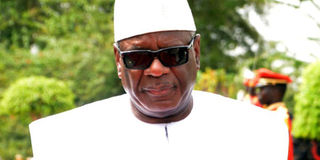Mali president extends hand to Tuareg minority

Mali's President Ibrahim Boubacar Keita arrives to take part in a ceremony on October 17, 2013 in Ouagadougou, to mark the 20th anniversary of the Organisation for the Harmonisation of African Business Law (OHADA in French). Photo/AFP
What you need to know:
- Mali's northern desert region makes up two-thirds of the territory but poverty is widespread among its Tuareg, Arab, Songhai and Fulani populations and basic infrastructure such as clean water, electricity, schools, hospitals and roads is sparse.
- The people of the Sahara desert feel abandoned by the political elites in Bamako and an entrenched sense of disenfranchisement has stoked various political or religiously-motivated rebellions in recent decades.
Malian President Ibrahim Boubacar Keita said Monday his country would respond to the "frustrations of our Tuareg brothers" as he opened a conference on devolving power to the west African nation's disaffected ethnic minorities.
Around 600 delegates - mainly central and regional government officials - are taking part in the meeting, part of a plan to broker peace with the restive north after it was occupied by Tuareg separatists following a military coup last year.
"We have to give definitive answers to the frustrations of our Tuareg brothers," Keita said, admitting to the "shortcomings and failures" of the country's treatment of its minorities over recent years.
"One of the causes of the disaster to befall our country is the failure of the state," Keita said.
VISION OF A STRONG STATE
"Our vision is of a strong state (but) a strong state is not incompatible with strong local communities," he went on, adding that central government should guarantee equal rights for all, as well as access to health care and education.
Mali's northern desert region makes up two-thirds of the territory but poverty is widespread among its Tuareg, Arab, Songhai and Fulani populations and basic infrastructure such as clean water, electricity, schools, hospitals and roads is sparse.
The people of the Sahara desert feel abandoned by the political elites in Bamako and an entrenched sense of disenfranchisement has stoked various political or religiously-motivated rebellions in recent decades.
The National Movement for the Liberation of Azawad (MNLA) launched the most recent insurgency to demand independence for northern Mali on behalf of the traditionally nomadic Tuareg last year, following rebellions in 1960, 1990 and 2000.
The uprising precipitated the fall of the region to militants linked to Al-Qaeda, but an intervention by French and African troops in January chased the rebels from the region's main cities.





